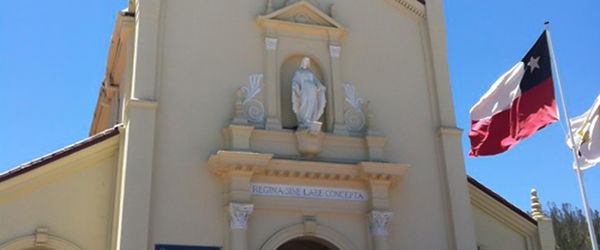Miguel Brown’s pleasant demeanor quickly changes when he talks about his father’s absence, and how it has affected his personal and spiritual life.But a recent school art project has helped him regain his trust in God and has motivated him to go to church more often and read the Bible more often.And on the morning of Jan. 25, the St. John Bosco High School senior was getting ready to meet the person who inspired the art project, Immaculée Ilibagiza, a member of the Tutsi tribe who survived a 1994 genocide led by the rival Hutu tribe in her native Rwanda.After reading a few chapters in her autobiographical book, “Left to Tell,” Brown showed his artistic skills for the first time, drawing Ilibagiza clutching a rosary, her face etched in sorrow and pain.Faculty of the Bellflower school developed a school-wide reading initiative, and concurrent art project, using the story of Ilibagiza as a “means of exploring human rights violations counterbalanced by the hope in God.”“I got inspired by her story,” said Brown. “It was a lot of emotion she was going through, battling with her faith. I’ve had times when I’ve been battling with my faith and her story helped me realize that Jesus is real and that he’s there to protect us.”The purpose of the project was also to help students discover the consequences of violence and how these could be addressed based on Catholic social teaching. The curriculum objectives included analyzing responses to civic issues at a local, national and international level; analyzing the causes of civic conflict and how decision-making processes and structures can avert or respond to such conflicts; and the response of Christians to violence and the violation of human rights. In “Left to Tell,” Ilibagiza narrates the terror shared by her and six other women, including a seven-year-old girl, who spent 91 days huddled together inside a 3-by-4-foot bathroom in the house of a local protestant pastor (a Hutu, and good friend of Ilibagiza’s family), hiding from the Hutus who were raping and killing women and men. “They never found me, but I found myself,” she says.While in the bathroom, she prayed the rosary an average of 27 times a day, she said. All the time she kept in her hands a red-and-white-beaded rosary that her father had given her. At the end of the ordeal she learned that her parents and two of her three brothers (one brother was studying abroad) had been killed together with thousands of Tutsis. “There have been times in my life,” said Brown, “that I would say, ‘Why is this happening to me? Why does a kid like me doesn’t have a father?’ I thought that if He was there he wouldn’t let this happen.“But then, when I read how when she [Ilibagiza] was in the bathroom she heard God telling her, ‘I’ll do anything for you,’ I realized that He is always there for us.”‘Our task is to be loving’That was the message that Ilibagiza, now a married mother of two, conveyed during her presentation at Bosco’s auditorium, full at capacity with its 750 students, staff and faculty, together with 326 seniors from all-girls St. Joseph High School in Lakewood.“Our task every day is to be a loving person,” she told the attentive audience. “We need to think ‘what could we have done differently,’ because every day could be the last day of our lives.“When I was pushed into the pain, my answer was to let go. And I’m so thankful that I finally found something in my life to forgive. It is freedom not to compete with people who are hurting.”Ilibagiza, who at the time of the massacre was a college student majoring in electrical and mechanical engineering, personally forgave the man who had killed her mother and a brother.“A huge weight was lifted from my shoulders at that moment. Forgiveness equals peace and freedom,” she said, explaining how her father’s teachings helped her endure the difficult times. Her father was a school principal and her mother was a teacher.“He told us not to judge people, not to put people in boxes,” she said. “If you make an effort not to judge people you will help your neighbor.“We all go through pain in life, and when things are not going the way I want I have to remind myself to be happy and appreciative of what I have. When you have been relieved from painful situations it helps put everything into perspective.”She urged the students to discover their talents within and shared how she learned English during those 91 days using only a Bible and a dictionary.“You have everything in you,” she told the young audience. “It is all about our will. If you put it in your mind you will find it.”The publishing of her book was part of that mindset, she said.“Left to Tell” and other books she has co-authored are best-sellers that have been translated into more than 30 languages. Her most recent book, “The Boy Who Met Jesus,” is being made into a movie.In 2007, Ilibagiza established the Left to Tell Charitable Fund to support Rwandan orphans. “She is an authentic example of a hero,” Salesian Father Joseph Thinh Nguyen, director of St. John Bosco High School and the Salesian Community in L.A., told The Tidings. “I see her emotion and sincerity and how she worked through it all suppressing anger and pain, and how through the grace of God she made sense of it, which helped her to forgive.”“‘Left to Tell’ is about reconciliation,” said Bosco English teacher Judith Day. “In her story, the message of God’s presence is so simple and clear.”For more information about Immaculée Ilibagiza, visit www.immaculee.com.{gallery width=100 height=100}gallery/2013/0222/spimmaculee/{/gallery}

